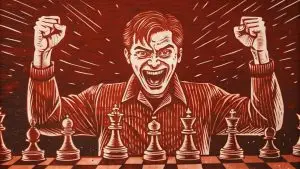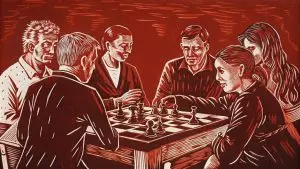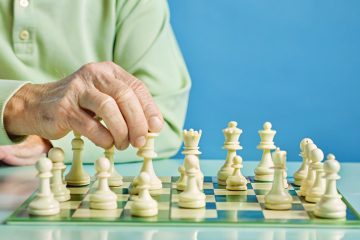Chess Therapy: How the Game Can Help Overcome Anxiety and Depression
For centuries, the game of chess has captivated minds around the world with its strategic depth and intellectual challenge. However, beyond its reputation as a competitive pastime, chess holds immense potential as a therapeutic tool for mental health. In our fast-paced and often stressful modern world, finding effective ways to manage anxiety and depression is crucial. This article explores “Chess Therapy: How the Game Can Help Overcome Anxiety and Depression ,” showcasing how this ancient game can significantly improve mental health, supported by compelling case studies and groundbreaking research.
Mental health is a complex issue that often requires a mix of approaches. In addition to traditional therapies and medications, activities like chess can be beneficial. Chess demands focus and strategic thinking, providing a helpful distraction from negative thoughts and reducing stress.
The game also introduces structure and routine, which can be soothing for those with anxiety or depression. Its social aspect helps alleviate feelings of loneliness and fosters emotional connections.
Research shows that chess can significantly improve mental health, aiding cognitive rehabilitation and emotional regulation. This article will explore the mental health benefits of chess and the supporting evidence. Chess is more than just a game; it’s an effective tool for enhancing mental well-being, beneficial for both seasoned players and beginners.

Mental Health Benefits of Chess
Chess is much more than a game. It is the powerful tool that could be used toward better mental health and well-being. Here are some specific ways chess can help people in managing anxiety and depression:
- Cognitive Preoccupation: Playing chess requires deep concentration and strategy-exercise in problem-solving. This intense mental exercise on a particular subject could turn out to provide sufficient cognitive distraction from the negative thoughts of the self and may, hence, decrease rumination that is usually observed in both the states of anxiety and depression. Such preoccupation with a complex mental activity will allow mental escape that also comes with a feeling of accomplishment.
- Routine and Structure: The game of chess imposes routine and structure on one’s life when played regularly. For a person who is experiencing anxiety or depression, structured activities can be soothing because they bring about stability and control. There is a clear order introduced by the rules of the game and its goals that may be
- Stress Relief: A game of chess brings the mind close to a sort of meditation, wherein focusing on the game keeps one present in the moment. Much of this mindfulness lowers levels of tension and soothes the mind.
- Improved Self-Esteem: One can feel an enhancement of self-esteem and confidence when achieving mastery over new skills, as well as small victories against opponents during chess games. Each game teaches something and allows for growth in a person, thus enhancing one’s feeling of self-worth and capability.
- Social Activity: Chess is, in fact, a social sport, be it played online or by physically meeting up. Through chess, one would thus often relieve the feelings of isolation and loneliness, major causative factors for anxiety and depression. Building on relationships and sharing experiences with other players provides emotional support.
- Emotional Regulation: Chess requires strategy, which develops emotional regulation in a player by teaching him to be patient, cool-headed, and composed in thoughts before he executes any action. All of these traits translate into real life situations by handing the user better control over their emotions, enabling them to respond more aptly to the stressors.
- Long-Term Mental Health Benefits: Several scientific studies prove that chess and other mentally challenging games have been related to long-term cognitive health prospects. Through continuous exercises for the brain, mental activity can be ensured not to suffer a decay of abilities, as mental functioning will enhance through the regular exercising of the brain. This could enhance mental health in old age.
- What is chess therapy and how does it work?Chess therapy utilizes the strategic game of chess as a therapeutic tool to improve mental health. It engages cognitive functions, promotes mindfulness, and enhances emotional resilience, making it effective against anxiety and depression.
- Who can benefit from chess therapy?Chess therapy is beneficial for individuals of all ages facing anxiety, depression, or seeking cognitive stimulation and social engagement. It complements traditional therapies by offering structured mental activity.
- What are the mental health benefits of playing chess?
- Playing chess helps in managing anxiety and depression through various mechanisms: Cognitive engagement: Chess requires deep concentration and problem-solving, which can distract from negative thoughts.
- Routine and structure: Regular gameplay provides stability and control, beneficial for those experiencing anxiety or depression.
- Stress relief: Focusing on the game promotes mindfulness and reduces tension.
- Social interaction: Whether online or in-person, chess fosters social connections that alleviate feelings of isolation.
- Emotional regulation: Strategic thinking in chess teaches patience and composure, skills useful in managing emotions.
- Who can benefit from chess therapy?Chess therapy is beneficial for individuals of all ages facing anxiety, depression, or seeking cognitive stimulation and social engagement. It complements traditional therapies by offering structured mental activity.
- How can someone start using chess for mental health benefits?To begin with chess therapy:
- Learn the basics: Start with understanding chess rules and basic strategies.
- Practice regularly: Engage in casual games or join chess clubs to maintain a routine.
- Set realistic goals: Focus on improving skills gradually and celebrate progress.
- Use chess as mindfulness: Practice mindfulness during gameplay to enhance its therapeutic benefits.
- What are the long-term benefits of incorporating chess into a mental health regimen?Long-term benefits include improved cognitive functions, better emotional resilience, and reduced risk of cognitive decline in old age. Chess provides ongoing mental stimulation and social interaction essential for mental well-being.
Case Studies Showing the Effect of Chess
Several case studies have been conducted to test chess as a therapeutic technique for anxiety and depression. These studies give valuable evidence of how chess has a positive effect on mental health. Here are some examples:
Case Study 1: The Mind Chess Academy
Overview: A six-month study of 30 people diagnosed with anxiety and depression was conducted by the Mind Chess Academy. The subjects played once a week.
Findings:
- Anxiety Reduction: 25% reduction in anxiety symptoms reported by participants. The strategic and engaging nature of chess helped divert minds away from anxious thoughts, providing decentralization of mind.
- Improved mood: 70% of the subjects reported improvement in their mood. The sense of achievement, feeling of progress learning the game added to it.
- Enhanced Social Interaction: The frequency of chess sessions allowed the agents to create new social networks. This interaction reduced social isolation that may frequently play a key role in depression.
Participant Feedback: One participant noted, “Chess gave me an expectation on the week. It broke the chain of anxiety pressure and tension in my life. Coming together with others and talking about what we had done was most encouraging.”
Case Study 2: Chess in Schools Initiative
Overview: This project exposed children who have emotional and behavioral disorders in a number of schools to chess. In this study, the intervention was conducted over a one-year time period whereby students received a weekly chess class.
Findings:
- Reduced Depressive Symptoms: Teachers and parents have reported that students began showing fewer symptoms of depression. Many students developed an interest in school and other activities.
- Better Emotional Regulation: By playing chess regularly, students became much better at handling frustration and anxiety. Chess held so many strategic elements within the game that it encouraged young children to think before reacting to their actions, which of course translated into daily life.
- Teacher Observations: “I definitely see a difference in my students’s behavior,” said one teacher. “They were more focused, patient, and less prone to outbursts.” The teachers remarked that chess had taught these students to think ahead but learn to remain calm when under pressure.
Case Example 3: Chess and Veterans
Overview: A study focused on veterans that suffered from PTSD, anxiety, and depression. Fifty veterans who attended a structured chess program over a period of six months.
Findings:
- Improved Cognitive Functions: There was improvement in memory and problem-solving among these veterans. The cognitive demands on the brain while playing chess kept their minds sharp and alert.
- Improved Emotional Stability: Symptoms of anxiety and depression reduced considerably. The routine and mental challenge through chess were almost therapeutic in nature.
- Stronger Social Bonds: The veterans developed an emotional closeness with each other over the game of chess. It created a sense of brotherhood or fraternity through which they could support and help one another.
- Veteran Testimony: “For us, chess was so much more than just a game. It was a way to connect, to share our struggles and find some normalcy and purpose. It helped me feel less lonely, more able to stand up against my challenges.”
Case Study 4: Online Chess Therapy for Adults
Overview: This was an online chess therapy program for adults with mild to moderate depression and anxiety. For three months, participants played chess and then participated in facilitated therapeutic discussions regarding their games.
Findings:
- Reduced Depressive Symptoms: Participants treated showed a significant reduction in depressive symptoms. This dual approach provided both chess and therapy as vehicles for mental health.
- Much more frequent engagement and greater motivation: The ease of the online format made it easy to engage in its regularity. They felt motivated towards improving their chess skills and looked forward to sessions.
- Improved Social Connections: Even in a virtual setting, participants formed meaningful connections. The discussions around their chess games facilitated deeper conversations and support.
- Participant Reflection: “For me, the chess therapy program was a godsend. It took my great love of learning and combined it with the great support that I needed to fight the depression. The online community was so supporting, so I feel connected and understood a lot more.”

Research on How Chess is a Therapeutic Tool
Recently, chess has attracted much scientific research as one of the great tools to help in mental health therapy or speeding up therapy and improving well-being. Most of the scientific studies have been about the cognitive, emotional, and social gains that chess yields in treating depression and anxiety. What follows herein below are some of the key research findings in this regard:
-
Cognitive Gains:
Improvement of Cognitive Functions: Research published in the journal Frontiers in Psychology has proved that regular chess playing improves cognitive functions like memory, problem-solving, spatial reasoning, etc. Such cognitive skills are very helpful in being mentally sharp and agile.
-
Emotional Regulation:
Reduced Depressive Symptoms: Studies have proved that frequent playing of the game can contribute to a reduction in symptoms of depression. Through strategic thinking and focusing on chess, it helps to soothe emotional management and builds immunity from stressful events.
-
Social Interactions:
Enhanced Interpersonal Relationships : Whether played over a computer or in person, chess does not fail to provide opportunities for social interaction and community relationship. Getting into chess clubs, tournaments, or websites can reduce one’s feelings of loneliness and isolation, which are quite common contributors to anxiety and depression.
-
Long-term Benefits:
Prevention of Cognitive Decline: Those who have played chess throughout their lives could actually help reduce the risks of having cognitive decline and neurodegenerative diseases in old age. This places a premium on the long-term advantages associated with making chess part of an overall health regimen.

Practical Tips on How to Use Chess to Manage Anxiety and Depression
Chess may become a robust tool for the management of anxiety and depression by providing structure, mental activity, and social interaction. Here are some practical tips on how to include chess in your routine for its effectiveness to be figured out within the process:
-
Start Small and Build Confidence
- Basic Skills: Learn basic rules and other rudiments of chess if you are an absolute beginner. Learn how pieces move and some simple strategies.
- Play Casual Games: Play casual games against friends, family, or online opponents.
- Establish a Routine: Set up regular practice sessions; for chess practice, set up dedicated times of the week. Having a routine might be almost comforting to fall back upon in order to manage anxiety in most predictable and structured ways.
- Chess as a Break: Try to include some chess breaks during stressful or overwhelming periods to help regenerate the focus of your mind and relieve tension.
-
Join a Community or Club
- Online platforms: Join online chess communities or forums where one could play games or discuss strategies, etc. about the game with other fellow enthusiasts.
- Get Involved With a Local Chess Club or Attend Chess Meetups: Participate with people having an interest in chess to acquire social support from the local chess club or by attending chess meetups. Practice self-advocacy to reduce feelings of isolation.
-
Realistic Goals
Near-Term GoalsSet realistic goals for yourself regarding your chess practice, such as focusing on improving your opening repertoire or solving a specific quantity of chess puzzles each week.
- Cheer on Progress: Be proud and celebrate any small victories on the board in your chess career. Progress will give you a surge of self-confidence and motivation to know you’re on the right path.
-
Chess as a Mindfulness Practice
- Mindfulness: Take note of the present moments in the game and the strategic decisions you make during the game. You can engage fully in the game, sustained without disturbance or background noise.
- Deep Breathing: It is possible to incorporate deep breathing as one goes about playing chess. It relaxes the individual or player and reduces tension by generally lowering the level of anxiety.
- What should beginners know before starting chess therapy?Beginners should start by learning basic rules, piece movements, and simple strategies. Starting with casual games and gradually increasing difficulty helps build confidence and enjoyment in chess as a therapeutic activity.
- How can chess improve cognitive functions in individuals experiencing anxiety or depression?Regular chess playing stimulates memory, problem-solving skills, and spatial reasoning, which are crucial for maintaining cognitive functions. This mental exercise helps in combating cognitive decline associated with aging and mental health challenges.
- Can playing chess cause stress or frustration?Like any competitive activity, chess can sometimes be stressful or frustrating, especially for beginners. It's important to approach the game with a positive mindset and view challenges as opportunities for learning and growth. Taking breaks and practicing self-compassion can help manage any negative feelings.
- Can chess be used preventively for mental health?Engaging in mentally stimulating activities like chess from a young age may contribute to better cognitive resilience and mental health throughout life. While it cannot guarantee prevention, incorporating chess into daily routines can be a proactive step towards maintaining mental well-being.
Conclusion
It is because of this unique combination that chess manages to provide a blend of mental stimulation, structured routines, and social interaction, which will make it an exceptional ally in the struggle against anxiety and depression. Case studies and research always demonstrate the deep positive effects chess has on mental health and confirm its sets as a powerful tool for therapy. It implies that through chess, one will be given a rewarding and supportive method to enhance mental well-being and confidently stride along the journey towards better mental health. Let the game of kings stroll you into a healthier and stronger mind!



1 Comment
Winston · 19/10/2024 at 20:46
Winston here from Iowa. I’m always watching to see what newer sites are going up and I just wanted to see if you would like an extra hand with getting some targeted traffic, Create custom AI bots to answer questions from visitors on your site or walk them through a sales process/funnel – I could even make a persona of yourself or employee to field questions about your business. I create/edit videos/images/adcopy, create/revamp/update sites, remove negative listings, the list goes on. I’ll even shoulder 90% of the costs, dedicating my time and tools that I’ve created myself and bought over the years. I’ve been doing this for over 22 years, helped thousands of people and have loved every minute of it.
There’s virtually no cost on my end to do any of this for you except for my time starting at 99 a month. I don’t mean to impose; I was just curious if I could lend a hand.
Brief history, I’ve been working from home for a couple decades now and I love helping others. I’m married, have three girls and if I can provide for them by helping you and giving back by using the tools and knowledge I’ve built and learned over the years, I can’t think of a better win-win.
It amazes me that no one else is helping others quite like I do and I’d love to show you how I can help out. So, if you need any extra help in any way, please let me know either way as I value your time and don’t want to pester you.
PS – If I didn’t mention something you might need help with just ask, I only mentioned a handful of things to keep this brief 🙂
All the best,
Winston
Cell – 1-319-435-1790
My Site (w/Live Chat) – https://cutt.ly/bec4xzTQ